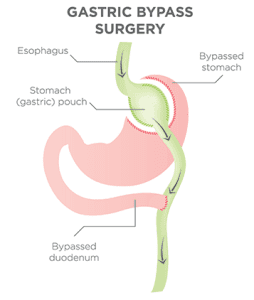Introduction
Bariatric surgery offers a life-changing path for individuals struggling with obesity. This article delves into the world of bariatric surgery, exploring who may benefit, the types of procedures available, and the potential weight loss outcomes.
Who is suitable for bariatric surgery?
Ideal candidates for bariatric surgery are individuals with a Body Mass Index (BMI) of 40 or higher or those with a BMI of 35 or higher with obesity-related health conditions such as diabetes or hypertension. Candidates should have unsuccessfully attempted other weight loss methods and be committed to making lifestyle changes post-surgery.

Which bariatric surgery is the right one for you?
- Gastric Bypass: Suitable for those with a BMI of 40 or higher or BMI 35 or higher with health conditions. It’s effective for substantial weight loss and improved health.
- Sleeve Gastrectomy: Suitable for individuals with a BMI of 35 or higher, especially those looking for significant weight loss and improvement in obesity-related health issues.
- Gastric Banding: Suitable for those with a lower BMI (30 and above) seeking moderate weight loss with a reversible procedure.

Gastric Sleeve

Gastric Bypass
What are types of bariatric surgery?
- Gastric Bypass:
- In this procedure, the surgeon creates a small stomach pouch and reroutes the small intestine, limiting food intake and nutrient absorption. It’s suitable for those seeking substantial weight loss and improvement in obesity-related health issues.
- Sleeve Gastrectomy:
- This surgery involves removing a portion of the stomach to create a smaller, banana-shaped stomach. It restricts the amount of food one can consume and is effective for significant weight loss.
- Gastric Banding:
- A band is placed around the stomach, creating a small pouch. Adjustable and reversible, gastric banding is suitable for those seeking moderate weight loss with a less invasive approach.
How much weight can you lose with bariatric surgery?
On average, patients can lose 60% to 80% of their excess body weight within the first year after bariatric surgery. This can amount to a significant weight loss, ranging from 30 to 150 kilograms, depending on factors like starting weight and adherence to post-operative guidelines.

Conclusion
Bariatric surgery is a powerful tool for achieving significant weight loss and improving obesity-related health conditions. The choice of procedure depends on individual factors and goals. Success requires commitment to post-surgery lifestyle changes. Before embarking on this transformative journey, individuals should consult with healthcare professionals to determine the most suitable approach for their unique circumstances. Bariatric surgery is not only about shedding pounds but also about gaining a healthier, more fulfilling life.
Disclaimer: The content on this blog is intended for general informational purposes only. It is not a substitute for professional medical advice, diagnosis, or treatment. Always consult qualified healthcare providers for personalized advice. Information regarding plastic surgery, dental treatment, hair transplant, and other medical procedures is educational and not a guarantee of results. We do not assume liability for actions taken based on blog content. Medical knowledge evolves; verify information and consult professionals. External links do not imply endorsement. By using this blog, you agree to these terms.










